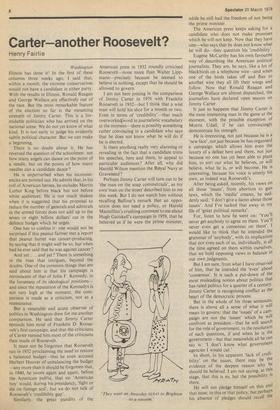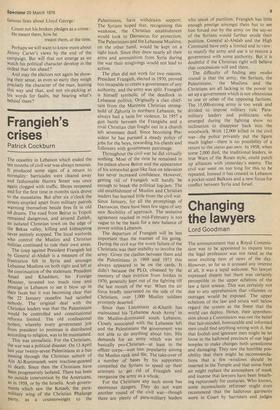Carter another Roosevelt?
Henry Fairlie
Washington Illinois has done it! In the first of these columns three weeks ago, I said that, within a month, the extreme conservatives would not have a candidate in either party. With the results in Illinois, Ronald Reagan and George Wallace are effectively out of the race. But the most remarkable feature of the election so far is the mounting strength of Jimmy Carter. This is a formidable politician who has arrived on the national scene. We do not yet know of what kind. It is too early to judge his evidently subtle political character. But we can make a beginning.
There is no doubt about it. He has reversed the question of the schoolmen: not how many angels can dance on the point of a needle, but on the points of how many needles can a candidate dance?
He is unperturbed when his inconsistencies are pointed out. He admits that, in his roll of American heroes, he includes Martin Luther King before black but not before white audiences. He is not much shaken when it is suggested that his proposal to reduce the number of generals and admirals in the armed forces does not add up to the seven or eight billion dollars' cut in the defence budget which he urges.
One has to confess it: one would not be
surprised if this peanut farmer met a 'report that peanut butter was cancer-producing, by saying that it might well be'so, but when had he ever said that he was against cancer?
And yet . . . and yet ? There is something in the man that intrigues, beyond the doubts. One of the common things that are said about him is that his campaign is reminiscent of that of John F. Kennedy, in the looseness of its ideological positions— and since the reputation of the Kennedys is not very high at the moment, the comparison is made as a criticism, not as a reassurance.
But a venerable and acute observer of
politics in Washington drew for me another comparison. He said that Jimmy Carter reminds him most of Franklin D. Roosevelt's first campaign, and that the criticisms of Carter remind him most of the criticisms then made of Roosevelt.
It must not be forgotten that Roosevelt ran in 1932 proclaiming the need to restore a balanced budget—that he even accused Herbert Hoover of unbalancing the budget —any more than it should be forgotten that, in 1940, he swore again and again, before the American public, that no 'American boy' would, during his presidency, 'fight or die on foreign soil', but we do not talk of Roosevelt's 'credibility gap'.
Similarly, the great pundits of the American press in 1932 roundly criticised Roosevelt—none more than Walter Lippmann—precisely because he seemed to believe in nothing, except that he should be allowed to govern.
I am not here joining in the comparison of Jimmy Carter in 1976 with Franklin Roosevelt in 1932—butt think that a wise man will hold his shot for a month or two. Even in terms of 'credibility'—that much overworkediword in journalistic vocabulary at the moment—there is possibly something rather convincing in a candidate who says that he does not know what he will do if he is elected.
Is there anything really very alarming or revealing in the fact that a candidate trims his speeches, here and there, to appeal to particular audiences? After all, why did Harold Wilson mention the Royal Navy at Gravesend ?
Perhaps Jimmy Carter will turn out to be 'the man on the soap commercials', as my own 'man on the street' described him to me this week. But I do not watch him without recalling Balfour's remark that an opposition does not need a policy, or Harold Macmillan's crushing comment to me about Hugh Gaitskell's campaign in 1959, that he behaved as if he were the prime minister, while he still had the freedom of not being the prime minister.
The American press keeps asking for a candidate who does not make promises which he will not keep. Now that they have one—who says that he does not know what he will do—they question his 'credibility'. Eugene McCarthy has his own favourite way of describing the American political journalists. They are, he says, like a lot of blackbirds on a telephone wire—and when one of the birds takes off and flies to another wire they all lift their wings and follow. Now that Ronald Reagan and George Wallace are almost dispatched, the journalists have declared open season on Jimmy Carter.
It just so happens that Jimmy Carter is the most interesting man in the game at the moment, with the possible exception of Morris Udall, if he can convincingly demonstrate his strength.
He is interesting, not just because he is a 'new face', not just because he has organised a campaign which allows him even the luxury of a defeat here and there, not just because no one has yet been able to place him, to sort out what he believes, or will believe, what he is, or will become. He is interesting, because his voice is utterly his own, as indeed was Roosevelt's.
After being asked, recently, his views on all those 'issues', from abortion to gun laws, which the 'media' creates, he suddenly said: 'I don't give a damn about those issues'. And I've tucked that away in MY file of 'great political remarks'.
For, listen to how he went on: 'You'll never get anybody to agree on them. You'll never even get a consensus on them'. would like to think that he intended the grammar of 'anybody', with its implication that not even each of us, individually, is all the time agreed on them within ourselves, that we hold opposing views in balance in our own judgments. But I am sure, from what I have observed of him, that he intended the 'even' about 'consensus'. It is such a put-down of the most misleading notion about politics that has ruled politics for a quarter of a century. Jimmy Carter is recognising conflict as the heart of the democratic process.
But in the whole of his three sentences, there is above all a sense of what it will mean to govern: that the 'issues' of a campaign are not the 'issues' which he will confront as president—that he will search for the role of government, in the resolution of such questions, if and when he is the government—but that meanwhile all he can say is: 'I don't know what government agencies I would cut.' In short, in his apparent 'lack of credibility' on the issues, there may be the evidence of the deepest reason why he should be believed. I am not saying, at this stage, that this is so, but the possibility is there.
He will not pledge himself on this and that issue, to this or that policy, but perhaps his absence of pledges should recall the famous lines about Lloyd George: Count not his broken pledges as a crime: He meant them, how he meant them, at the time.
Perhaps we will want to know more about Jimmy Carter's views by the end of the campaign. But will that not emerge as we watch his political character develop in the ordeal that lies ahead ?
And may the electors not again be showing their sense, as even so early they weigh Precisely the character of the man, leaning this way and that, and not nit-picking at his words for faults, but hearing what's behind them?



































 Previous page
Previous page